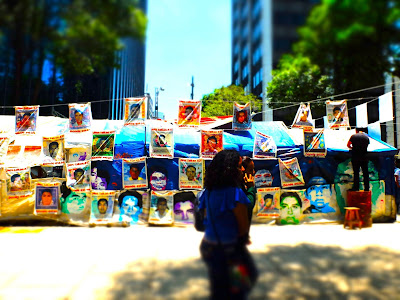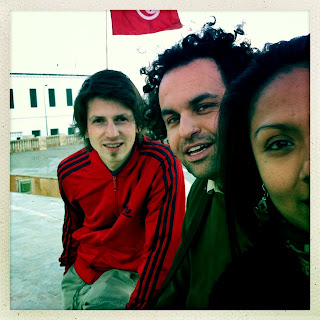Il Terzo Paradiso - the Third Paradise of Michelangello Pistoletto
Faenza, Italy. May 21st, 2010.
The International Festival of Contemporary Art "Festival de arte contemporanea", organized by Goodwill of Bologna, has been hold succesfully for the last three years in Faeza, Italy. During the recent edition, which took place on May 21st - 23rd, 2010, I had the possibility to follow some of the most interesting reflections on the role and meaning of the work of art in contemporary art.
Here I share my impressions about the talk "Il Terzo Paradiso", held on friday 21st May:
The art critic and curator Achille Bonito Oliva, the curator Mario Pieroni, and the musician Gianna Nannini (with a sound contribution) dialoged with Michelangelo Pistoletto, in a reflection on the work of art Il Terzo Paradiso.
Gianna Nannini created a sound installation for this occasion, in which explained that “the music is, first of all, the voice; it is the voice that encloses the music of the people, and it is taken from inside to outside.” For the musician, it is the voice that confers value to difference. Moreover, she told us that the spiritual power of both singing and voice, that of entering into another dimension, is a power that heals. Beyond the love for differences, being critic about the uniqueness of creativity is what she has in common with Michelangelo Pistoletto. The word “mom” is for her the access key to the Third Paradise.

Michelangelo Pistoletto - ph silvia rizzi
With the aim of presenting not only the recently published book of Michelangelo Pistoletto, The Third Paradise (Marsilio, 2010), but also the theoretical ideology and thought of the artist, the art critic Achille Bonito Oliva invited the artist to depict his vision on: art as anthropology, the relationship between artist/author and work of art in a demiurgical sense, the actual relationship between art and enterprise and the activity of writing, among other issues. That way, little by little, we were introduced to Pistoletto’s vision, citing also works of the past such as the Venere degli stracci (1967) and Tavolo Love difference (2003).
The Italian saint Padre Pio, inspired ABO to imagine another name for Pistoletto: “P’Io”. With a touch of geniality, the art critic described the work of the artist as an instrument to affront the complexity of life, as a position from which it is possible to start again in what he called “distopia”, specially referring to the mirrors of the artist. In ABO’s opinion, what the artist has undertaken through his work of art is a responsible art.
In accordance with the art critic, who declared that it is creativity to be at the center of the art production, Michelangelo Pistoletto explained that all is about a phenomenological process, i.e. the one asking if there is a God has already decided that there is an answer for that question. And in the same logic, it is not possible to separate the work of art from the artist, since both are the same thing. In this sense, the mirror puts in evidence that the work of art is inside of everone of us.
Remarkable are the last words of ABO, who could not abandon the platform without sharing one of his jokes, taking advantage of the resources that the Italian language offers, with an extraordinary effect: “Se l’arte serve, la critica sparecchia”. Better not to translate it into English.

Achille Bonito Oliva, Michelangelo Pistoletto - ph silvia rizzi
Written by Martha Jiménez Rosano - for Cyou, part of the International Festival of contemprary art, Faenza, Italy.
The International Festival of Contemporary Art "Festival de arte contemporanea", organized by Goodwill of Bologna, has been hold succesfully for the last three years in Faeza, Italy. During the recent edition, which took place on May 21st - 23rd, 2010, I had the possibility to follow some of the most interesting reflections on the role and meaning of the work of art in contemporary art.
Here I share my impressions about the talk "Il Terzo Paradiso", held on friday 21st May:
The art critic and curator Achille Bonito Oliva, the curator Mario Pieroni, and the musician Gianna Nannini (with a sound contribution) dialoged with Michelangelo Pistoletto, in a reflection on the work of art Il Terzo Paradiso.
Gianna Nannini created a sound installation for this occasion, in which explained that “the music is, first of all, the voice; it is the voice that encloses the music of the people, and it is taken from inside to outside.” For the musician, it is the voice that confers value to difference. Moreover, she told us that the spiritual power of both singing and voice, that of entering into another dimension, is a power that heals. Beyond the love for differences, being critic about the uniqueness of creativity is what she has in common with Michelangelo Pistoletto. The word “mom” is for her the access key to the Third Paradise.

Michelangelo Pistoletto - ph silvia rizzi
With the aim of presenting not only the recently published book of Michelangelo Pistoletto, The Third Paradise (Marsilio, 2010), but also the theoretical ideology and thought of the artist, the art critic Achille Bonito Oliva invited the artist to depict his vision on: art as anthropology, the relationship between artist/author and work of art in a demiurgical sense, the actual relationship between art and enterprise and the activity of writing, among other issues. That way, little by little, we were introduced to Pistoletto’s vision, citing also works of the past such as the Venere degli stracci (1967) and Tavolo Love difference (2003).
The Italian saint Padre Pio, inspired ABO to imagine another name for Pistoletto: “P’Io”. With a touch of geniality, the art critic described the work of the artist as an instrument to affront the complexity of life, as a position from which it is possible to start again in what he called “distopia”, specially referring to the mirrors of the artist. In ABO’s opinion, what the artist has undertaken through his work of art is a responsible art.
In accordance with the art critic, who declared that it is creativity to be at the center of the art production, Michelangelo Pistoletto explained that all is about a phenomenological process, i.e. the one asking if there is a God has already decided that there is an answer for that question. And in the same logic, it is not possible to separate the work of art from the artist, since both are the same thing. In this sense, the mirror puts in evidence that the work of art is inside of everone of us.
Remarkable are the last words of ABO, who could not abandon the platform without sharing one of his jokes, taking advantage of the resources that the Italian language offers, with an extraordinary effect: “Se l’arte serve, la critica sparecchia”. Better not to translate it into English.

Achille Bonito Oliva, Michelangelo Pistoletto - ph silvia rizzi
Written by Martha Jiménez Rosano - for Cyou, part of the International Festival of contemprary art, Faenza, Italy.


Comments